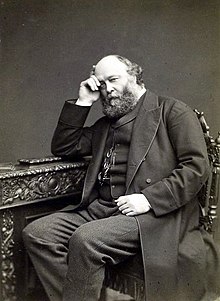The Liberal Unionist Party was a British political party that was formed in 1886 by a faction that broke away from the Liberal Party. Led by Lord Hartington and Joseph Chamberlain, the party established a political alliance with the Conservative Party in opposition to Irish Home Rule. The two parties formed the ten-year-long coalition Unionist Government 1895–1905 but kept separate political funds and their own party organisations until a complete merger between the Liberal Unionist and the Conservative parties was agreed to in May 1912.
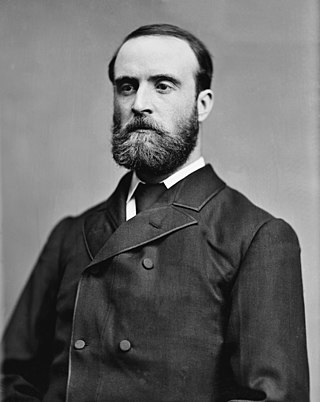
Charles Stewart Parnell was an Irish nationalist politician who served as a Member of Parliament (MP) from 1875 to 1891, also acting as Leader of the Home Rule League from 1880 to 1882 and then Leader of the Irish Parliamentary Party from 1882 to 1891. His party held the balance of power in the House of Commons during the Home Rule debates of 1885–1886.

Spencer Compton Cavendish, 8th Duke of Devonshire,, styled Lord Cavendish of Keighley between 1834 and 1858 and Marquess of Hartington between 1858 and 1891, was a British statesman. He has the distinction of having held leading positions in three political parties: leading the Liberal Party, the Liberal Unionist Party and the Conservative Party in either the House of Commons or the House of Lords. After 1886 he increasingly voted with the Conservatives. He declined to become prime minister on three occasions, because the circumstances were never right. Historian and politician Roy Jenkins said he was "too easy-going and too little of a party man." He held some passions, but he rarely displayed them regarding the most controversial issues of the day.

The 1895 United Kingdom general election was held from 13 July to 7 August 1895.

The 1892 United Kingdom general election was held from 4 to 26 July 1892. It saw the Conservatives, led by Lord Salisbury again win the greatest number of seats, but no longer a majority as William Ewart Gladstone's Liberals won 80 more seats than in the 1886 general election. The Liberal Unionists who had previously supported the Conservative government saw their vote and seat numbers go down.
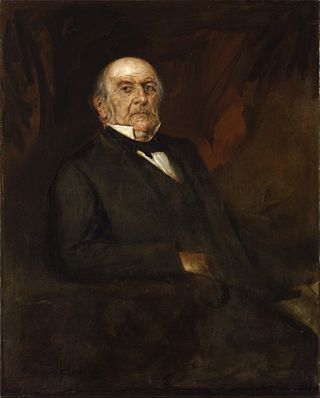
The third Gladstone ministry was one of the shortest-lived ministries in British history. It was led by William Gladstone of the Liberal Party upon his reappointment as Prime Minister of the United Kingdom by Queen Victoria. It lasted five months until July 1886.
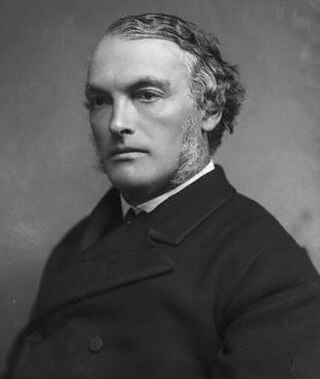
Henry James, 1st Baron James of Hereford,, known as Sir Henry James between 1873 and 1895, was an Anglo-Welsh lawyer and statesman. Initially a Liberal, he served under William Ewart Gladstone as Solicitor General in 1873 and as Attorney-General between 1873 and 1874 and 1880 and 1885. However, he broke with Gladstone over Irish Home Rule and joined the Liberal Unionists. From 1895 to 1902 he was Chancellor of the Duchy of Lancaster in the Unionist ministries of Lord Salisbury and Arthur Balfour.

Sir Wilfrid Lawson, 2nd Baronet was an English temperance campaigner and radical, anti-imperialist Liberal Party politician who sat in the House of Commons variously between 1859 and 1906. He was recognised as the leading humourist in the House of Commons.

The Redistribution of Seats Act 1885 was an Act of the Parliament of the United Kingdom. It was a piece of electoral reform legislation that redistributed the seats in the House of Commons, introducing the concept of equally populated constituencies, a concept in the broader global context termed equal apportionment, in an attempt to equalise representation across the UK. It was associated with, but not part of, the Representation of the People Act 1884.
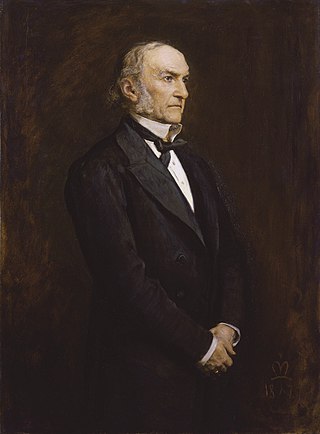
Gladstonian liberalism is a political doctrine named after the British Victorian Prime Minister and leader of the Liberal Party, William Ewart Gladstone. Gladstonian liberalism consisted of limited government expenditure and low taxation whilst making sure government had balanced budgets and the classical liberal stress on self-help and freedom of choice. Gladstonian liberalism also emphasised free trade, little government intervention in the economy and equality of opportunity through institutional reform. It is referred to as laissez-faire or classical liberalism in the United Kingdom and is often compared to Thatcherism.
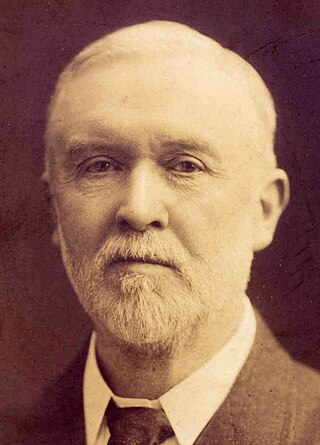
John Joseph Clancy, usually known as J. J. Clancy, was an Irish nationalist politician and Member of Parliament (MP) in the House of Commons for North Dublin from 1885 to 1918. He was one of the leaders of the later Irish Home Rule movement and promoter of the Housing of the Working Classes (Ireland) Act 1908, known as the Clancy Act. Called to the Irish Bar in 1887, he became a King's Counsel in 1906.

Jesse Collings was Mayor of Birmingham, England, a Liberal member of Parliament, but was best known nationally in the UK as an advocate of educational reform and land reform.
The Hawarden Kite was a famous British newspaper scoop of December 1885, that Liberal Party leader William Gladstone now supported home rule for Ireland. It was an instance of "kite-flying", made by Herbert Gladstone, son of the Leader of the Opposition William Ewart Gladstone, who often served as his father's secretary. It was given to Edmund Rogers of the National Press Agency in London. The statement was accurate but it is unknown whether the father knew and approved of releasing it to the press. The bombshell announcement resulted in the fall of Lord Salisbury's Conservative government. Irish Nationalists, led by Charles Parnell's Irish Parliamentary Party, held the balance of power in Parliament. Gladstone's conversion to Home Rule convinced them to switch away from the Conservatives and support the Liberals using the 86 seats in Parliament they controlled.
William Archibald Macdonald was an Irish nationalist politician and MP. in the House of Commons of the United Kingdom of Great Britain and Ireland and as member of the Irish Parliamentary Party represented Queen's County Ossory, 1886–92, and a supporter of Charles Stewart Parnell. He was one of the small number of blind people who have ever been members of the UK House of Commons.
In parliamentary politics, balance of power is a situation in which one or more members of a parliamentary or similar chamber can by their uncommitted vote enable a party to attain and remain in minority government. The term may also be applied to the members who hold that position. The members holding the balance of power may guarantee their support for a government by either joining it in a coalition government or by an assurance that they will vote against any motion of no confidence in the government or will abstain in such a vote. In return for such a commitment, such members may demand legislative or policy commitments from the party they are to support. A person or party may also hold a balance of power in a chamber without any commitment to government, in which case both the government and opposition groupings may on occasion need to negotiate for that person's or party's support.
The Newcastle Programme was a statement of policies passed by the representatives of the English and Welsh Liberal Associations meeting at the annual conference of the National Liberal Federation (NLF) in Newcastle upon Tyne in 1891. The centrepiece of the Newcastle Programme was the primacy of Irish Home Rule, but associated with it were a raft of other reforms, in particular: taxation of land values; abolition of entail; extension of smallholdings; reform of the Lords; shorter parliaments; district and parish councils; registration reform and abolition of plural voting; local veto on drink sales; employers' liability for workers' accidents and disestablishment of the Church of England in Wales and Scotland.

The vote of no confidence in the Rosebery ministry of 21 June 1895, also known as the Cordite vote, was the occasion on which the Liberal Government of the Earl of Rosebery was defeated in a vote of censure by the House of Commons. The motion was to reduce the salary of the Secretary of State for War as a censure over deficient supply of cordite to the Army. When it was passed, the Secretary of State Henry Campbell-Bannerman offered his resignation. As Campbell Bannerman was the most popular Minister in a Government which was suffering internal division and whose members had grown tired of office, the Government chose to interpret the issue as one involving confidence in the Government and therefore resigned. The incoming Conservative government soon sought a dissolution of Parliament and won the ensuing general election. The vote is the last time in the History of the British Parliament that a government has been defeated on a confidence motion when it had a workable majority.
The 1891 Waterford City by-election was a parliamentary by-election held for the United Kingdom House of Commons constituency of Waterford City on 23 December 1891. It arose as a result of the death of the sitting member, Richard Power of the Irish Parliamentary Party.
